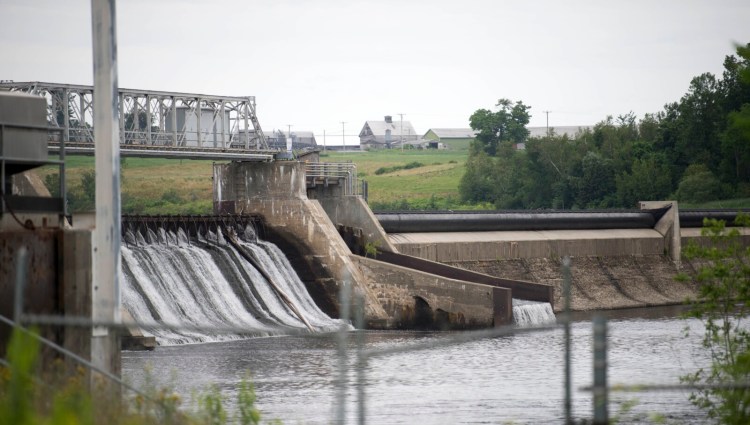The Atlantic Salmon Federation and other conservation groups on Thursday filed a lawsuit against Brookfield Renewable Energy and its partners, alleging the dam owner violated the Endangered Species Act by killing Atlantic salmon and other sea-run fish that are critical to commercial fishing and the health of the Gulf of Maine.
According to the lawsuit, the ongoing operations at four hydropower projects on the Kennebec River “take” the Gulf of Maine Distinct Population Segment of Atlantic Salmon, which is listed on Endangered Species Act-list. Those hydropower facilities are the Lockwood Project dam in Waterville, Hydro-Kennebec Project dam in Waterville and Winslow, Weston Project dam in Skowhegan and Shawmut Project dam in Fairfield. The lawsuit was filed in U.S. District Court, District of Maine.
The 26-page lawsuit cites the Endangered Species Act, which says “it is unlawful for any person subject to the jurisdiction of the U.S. to “take any such species within the United States or the territorial sea of the United States.” The suit is filed jointly by the Atlantic Salmon Federation, Conservation Law Foundation, Maine Rivers and Natural Resources Council of Maine.
The defendants, besides Brookfield Renewable Partners, are Merimil Limited Partnership, Hydro-Kennebec LLC, Brookfield White Pine Hydro LLC, Brookfield Power US Asset Management LLC and Brookfield Power US Holding America Co.
The Endangered Species Act defines “taking” as harassing, harming, pursuing, hunting, shooting, wounding, killing, trapping, capturing, collecting or attempting to engage in any such conduct. The dams are operating without authorization to take the fish, according to the lawsuit.
“Such an act may include significant habitat modification or degradation which actually kills or injures fish or wildlife by significantly impairing essential behavioral patterns, including, breeding, spawning, rearing, migrating, feeding or sheltering,” the lawsuit says.
Miranda Kessel, Brookfield’s manager of stakeholder relations, said in a statement Thursday that company officials are “disappointed that this action has been taken despite our ongoing engagement with federal fisheries agencies around initiatives already underway to ensure protection of fish species.”
“Brookfield Renewable is committed to responsible operations and is very much a vested partner in continued fisheries restoration of the lower Kennebec,” the Brookfield statement says.
Brookfield goes on to say the company filed a what’s called a species protection plan May 31 — a year before its deadline — and that federal agencies would review that protection plan as part of the Shawmut relicensing process.
“Brookfield Renewable has and will continue to consult closely with state and federal agencies on measures to mitigate impacts to migrating fish, including station shutdowns like those initiated in May,” the company said. “Brookfield Renewable will continue to pursue state of the art fish passage infrastructure and engage in fact-based dialogue with local stakeholders and affected communities regarding the potential negative economic, recreational, and social consequences that would result from dam removal.”
According to the lawsuit, the lower Kennebec River main stem, where the four projects are located, is the critical migration corridor for salmon, between the ocean and the Sandy River spawning and rearing critical habitat. The spawning habitat is above the Sandy River-Kennebec River confluence, located above the Weston Dam in Skowhegan.
“Thus, the combination of the four hydropower projects of Lockwood, Hydro-Kennebec, Shawmut, and Weston on the
lower Kennebec River main stem blocks Atlantic salmon access to the critical spawning and rearing habitat in the Sandy River area, which is located upstream from the 4-project barrier and impediment.”
The conservation groups issued a news release Thursday that says the lawsuit seeks to stop Brookfield from violating federal law, while also calling their hydropower facilities on the Kennebec River “obsolete.”
“The massive, multinational energy corporation Brookfield Renewable Partners (Brookfield) owns more than 5,000 dams worldwide, including 17 in the Kennebec watershed,” the release says. “Their four dams between Waterville and Skowhegan block access to spawning and rearing habitat for Atlantic salmon in the Sandy River and hinder restoration of American shad, alewives, blueback herring, sea lamprey, and American eel.”
Brookfield’s authorization to take the salmon trying to pass through dams expired in 2019, according to the release, which says the conservation groups that filed the lawsuit are asking the court to order Brookfield to cease operations that harm salmon during the migration period, which run from April 1 to Dec. 31.
“Maine can achieve a healthy Kennebec River that supports expanding fish populations and meets the needs of riverfront communities, including the continued operation of the SAPPI paper mill in Skowhegan,” the conservation groups said in a joint statement. “This future is only possible if Brookfield stops violating the law and starts to play a constructive role in solving the problems its four dams cause. Instead, the company is spreading fear and misinformation and violating one of America’s landmark environmental laws.”
The lower Kennebec surged back to life after the Edwards and Fort Halifax dams were removed in 1999 and 2008, the groups say. Removal brought back millions of sea-run fish, such as shad and river herring, but that success stalled because Brookfield’s Lockwood, Hydro-Kennebec, Shawmut and Weston dams create an impassable wall for adult salmon and other fish moving upstream from the Gulf of Maine, it says. Warm temperatures and predators in the 30 miles of stagnant water behind the dams also are killing younger salmon as they try to return to the ocean, the groups contend.
The suit maintains that Brookfield and partners continued to violate the Endangered Species Act after the conservation groups gave notice of its intent to sue, saying that in June, flashboard repair/replacement operations at the Lockwood Dam resulted in “severe trapping, injury, harm, and risked death, of at least 3 adult salmon and nearly two dozen smolts.”
The suit asks the court to award plaintiffs costs of litigation, including reasonable attorney and expert witness fees, as well as other such reasonable costs, expenses and disbursements, including attorneys’ fees.
Send questions/comments to the editors.




Comments are no longer available on this story